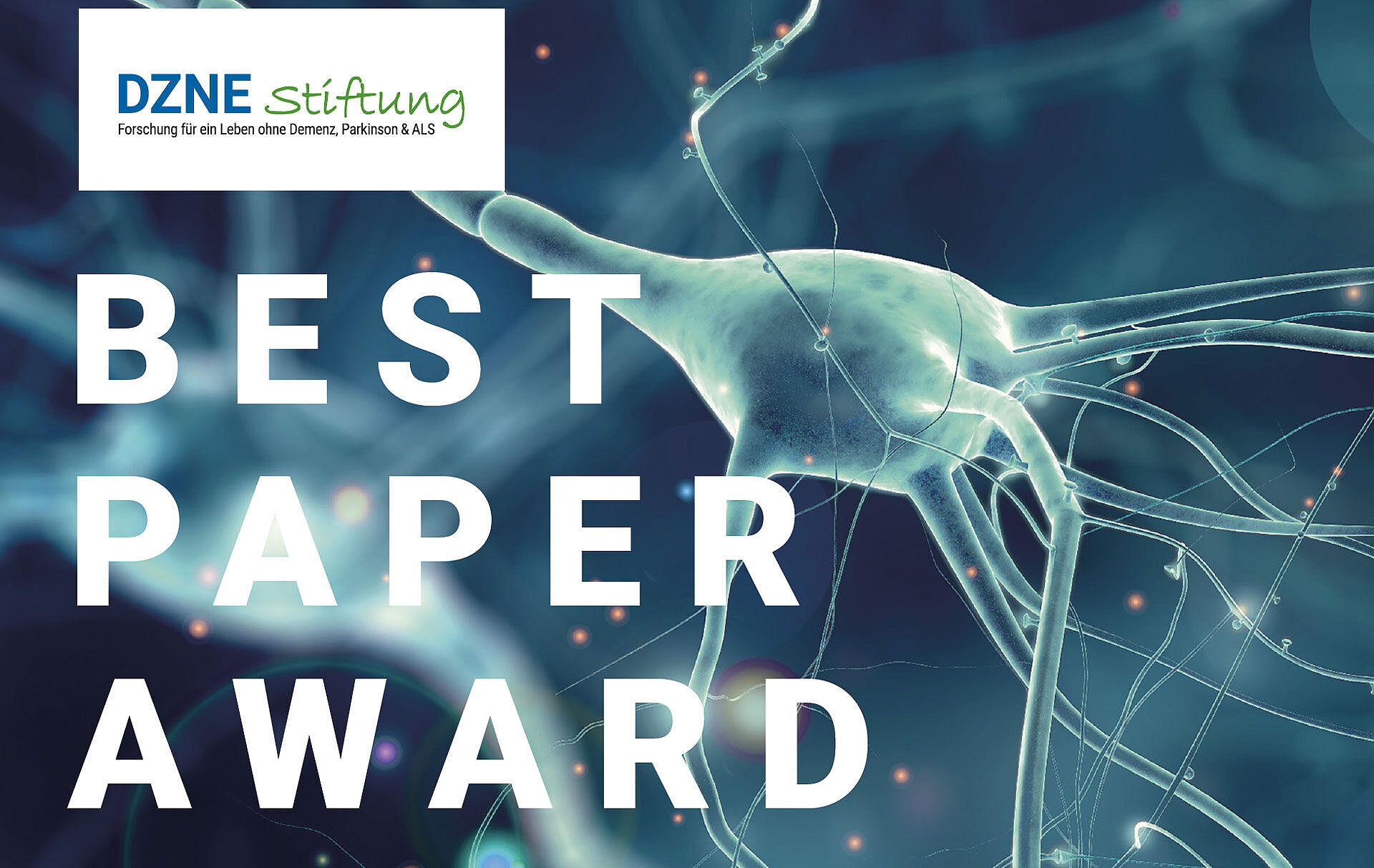Last year, for the second time, the DZNE Foundation announced a prize for the best single scientific publication from the DZNE Munich: Publications by first authors from fundamental, clinical, epidemiological or health care research at DZNE Munich could be submitted for the “Best Paper Award 2023”.
The papers should have been published in international peer-reviewed journals within the last 12 months prior to the call for papers and should have provided decisive impulses on pathogenesis, diagnosis, therapy or care of patients with neurodegenerative diseases.
The announcement of the award winner and the award ceremony recently took place at the DZNE Munich: The prize for the best publication, endowed with 500 euros each, was awarded to PD Dr. Jonathan Vöglein (RG Prof. Johannes Levin) for the article „Pattern and implications of neurological examination findings in autosomal dominant Alzheimer disease”, published in the journal "Alzheimer's & Dementia", and Karsten Nalbach (RG Prof. Stefan Lichtenthaler, previously AG Prof. Christian Behrends, LMU) for the article „Spatial proteomics reveals secretory pathway disturbances caused by neuropathy-associatedTECPR2“, published in „Nature Communications“.
Alzheimer's: Abnormalities in the physical examination predict the further course of the disease
The neurological examination is part of the standard repertoire of neurologists. Besides taking a medical history, it is the base for clinical care of patients with neurological diseases. Amongst other things, it includes the physical examination of cranial nerves, motor strength, deep tendon reflexes, coordination and sensory testing. Until now, however, it has not been evaluated whether findings in the neurological examination could be related to Alzheimer's disease. Neurologist Jonathan Vöglein and his colleagues have found in young patients with genetic Alzheimer's disease that abnormal neurological examination findings occurred in two-thirds of these patients: Common findings include increased deep tendon reflexes, gait disturbance, tremor, increased muscle tone, and saccadic smooth pursuit eye movement. The researchers used data from the worldwide observational study DIAN („Dominantly Inherited Alzheimer Network). This study examines people who have a rare hereditary variant of Alzheimer's, which is characterized by a very early onset of the disease at average at the age of 45. It is hoped that these findings will also improve our understanding of the much more common variant of Alzheimer's disease which usually manifests in old age.
Jonathan Vöglein and colleagues analyzed the data from the study and found that abnormal findings in the physical neurological examination were accompanied by more pronounced cognitive impairment and can even be helpful in predicting a more severe course of the disease.
In the DIAN study, cognitive performance deteriorated more than twice as fast in patients with abnormalities in the neurological examination than in those without abnormal findings. In line with this, MRI brain scans showed more pronounced brain shrinkage typical of Alzheimer's in patients with abnormal neurological examination findings. The findings of Vöglein and colleagues may therefore be significant for the planning of Alzheimer's therapy studies. Furthermore, these findings may directly benefit Alzheimer's patients in future, as the course of the disease could be predicted more precisely, enabling physicians to tailor treatment plans to individual needs.
Analyzing the underlying pathological mechanisms of a fatal neurological disease in children
Molecular biologist Karsten Nalbach and his colleagues investigated the cellular basis of the rare pediatric neuropathy HSAN9. HSAN9 is a hereditary disease of the peripheral nervous system characterized by progressive paralysis, developmental delay, and autonomous and sensory defects. Sensory disorders include numbness, tingling, pain and a reduced sensation of pain in the arms and legs. Autonomic disorders can include difficulties in regulating blood pressure, heart rate, sweat production and digestive functions. The first signs of the disease appear in early childhood and affected patients usually die before the age of 20. Currently, there is no cure for the disease.
The cause of HSAN9 is a lack of a protein called TECPR2, which occurs naturally in our cells, due to a genetic defect. TECPR2 is important for cell metabolism, in particular the degradation of misfolded proteins or damaged cell components through a process known as autophagy. It also plays a role in protein transport and secretion. Since only a few research studies on TECPR2 have been conducted so far, its mechanistic involvement in both processes and resulting effects are largely unknown.
Nalbach and colleagues conducted research on this, especially concerning the transport of proteins, in the laboratory using cellular models. The scientists found that in cells with too little TECPR2, the export of proteins from the endoplasmic reticulum, an important part of the cell, was disrupted. This had an impact on other cell parts. In addition, the transport of several proteins with essential neuronal functions was affected.
The findings of Nalbach and his colleagues contribute to an understanding of how TECPR2 impacts the cellular protein balance. This will provide guidance for future studies to systematically investigate corresponding changes in neuronal systems and animal disease model and thus create the basis for the development of active substances for children that specifically target the pathomechanism.
The award was decided by a jury of international experts. The funding is provided to the DZNE Foundation by a donor in order to specifically support research at the Munich site. Within the next three years, the Best Paper Award of the DZNE Foundation will therefore continue to be presented once a year at the Munich site.
The next call for the Best Paper Award at the the Munich site will take place in fall 2024.

